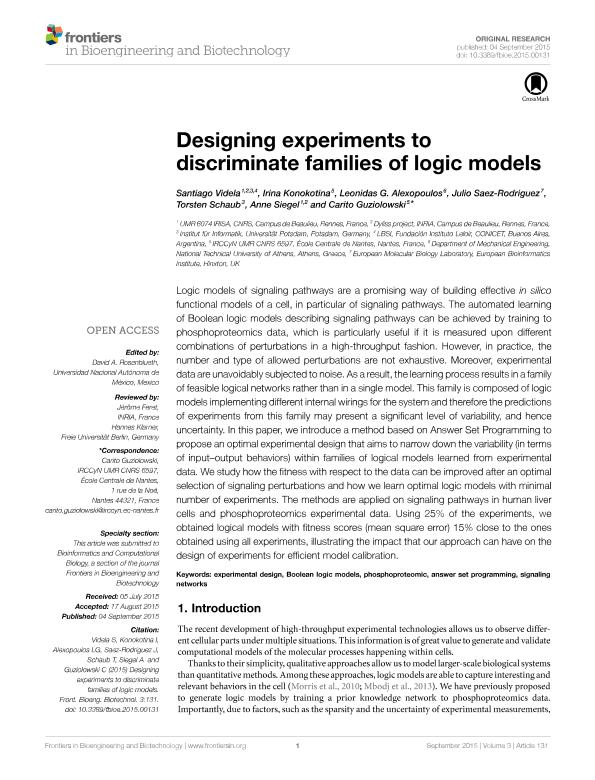Artículo
Designing Experiments to Discriminate Families of Logic Models
Videla, Santiago ; Konokotina, Irina; Alexopoulos, Leonidas G.; Saez Rodriguez, Julio; Schaub, Torsten; Siegel, Anne; Guziolowski, Carito
; Konokotina, Irina; Alexopoulos, Leonidas G.; Saez Rodriguez, Julio; Schaub, Torsten; Siegel, Anne; Guziolowski, Carito
 ; Konokotina, Irina; Alexopoulos, Leonidas G.; Saez Rodriguez, Julio; Schaub, Torsten; Siegel, Anne; Guziolowski, Carito
; Konokotina, Irina; Alexopoulos, Leonidas G.; Saez Rodriguez, Julio; Schaub, Torsten; Siegel, Anne; Guziolowski, Carito
Fecha de publicación:
04/09/2015
Editorial:
Frontiers Media
Revista:
Frontiers in Bioengineering and Biotechnology
e-ISSN:
2296-4185
Idioma:
Inglés
Tipo de recurso:
Artículo publicado
Clasificación temática:
Resumen
Logic models of signaling pathways are a promising way of building effective in silico functional models of a cell, in particular of signaling pathways. The automated learning of Boolean logic models describing signaling pathways can be achieved by training to phosphoproteomics data, which is particularly useful if it is measured upon different combinations of perturbations in a high-throughput fashion. However, in practice, the number and type of allowed perturbations are not exhaustive. Moreover, experimental data are unavoidably subjected to noise. As a result, the learning process results in a family of feasible logical networks rather than in a single model. This family is composed of logic models implementing different internal wirings for the system and therefore the predictions of experiments from this family may present a significant level of variability, and hence uncertainty. In this paper, we introduce a method based on Answer Set Programming to propose an optimal experimental design that aims to narrow down the variability (in terms of input-output behaviors) within families of logical models learned from experimental data. We study how the fitness with respect to the data can be improved after an optimal selection of signaling perturbations and how we learn optimal logic models with minimal number of experiments. The methods are applied on signaling pathways in human liver cells and phosphoproteomics experimental data. Using 25% of the experiments, we obtained logical models with fitness scores (mean square error) 15% close to the ones obtained using all experiments, illustrating the impact that our approach can have on the design of experiments for efficient model calibration.
Archivos asociados
Licencia
Identificadores
Colecciones
Articulos(IIBBA)
Articulos de INST.DE INVEST.BIOQUIMICAS DE BS.AS(I)
Articulos de INST.DE INVEST.BIOQUIMICAS DE BS.AS(I)
Citación
Videla, Santiago; Konokotina, Irina; Alexopoulos, Leonidas G.; Saez Rodriguez, Julio; Schaub, Torsten; et al.; Designing Experiments to Discriminate Families of Logic Models; Frontiers Media; Frontiers in Bioengineering and Biotechnology; 3; 04-9-2015; 131
Compartir
Altmétricas



